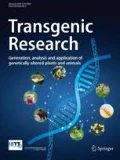Transgenesis technology, developed in the 1970s, has been used to obtain genetically-engineered (or genetically-modified) organisms for various applications. In agriculture, the technology contributes to plant breeding by introducing useful traits such as herbicide tolerance, pest resistance, enhanced nutritious composition and other features of interest in targeted crop species. Commercial production of genetically-engineered crop varieties, which began in 1996, expanded to 24 countries by 2017 and represents a significant part of the current production of maize, soybean, cotton and rapeseed (canola), mostly used for feed, oil and textiles in many regions of the world.
To date, a group of new biotechnology methods that emerged in the 2000s, genome editing, is being rapidly applied to develop agricultural varieties. While transgenesis involves random insertion of foreign genes, genome editing enables direct and precise manipulation of endogenous genes in living organisms. Thanks to the recent development of new gene editors such as the CRISPR (Clustered Regulatory Interspaced Short Palimdromic Repeats)/Cas9 systems, genome editing has become a powerful and widespread technique whose possibilities continue to grow due to fast-use and low-cost tools. In spite of its great potential to provide profitable commodities, genome editing poses safety concerns as a new type of genetic engineering, and also raises policy implications associated with divergent or unsettled regulatory status for this technology between countries.
The OECD has carried out programmes of work on the safe use of biotechnology since the mid-1980s. The ‘Recombinant DNA Safety Considerations’, issued in 1986, provided international principles for the use of transgenesis and science-based safety considerations for industrial, agricultural and environmental applications of organisms derived by recombinant DNA techniques. Also known as the OECD ‘Blue Book’, this publication still constitutes the basic concept for risk assessment which underpins most of the current national and international biosafety regulations. In the 1990s, two OECD Working Groups were established, with the goal of harmonising regulatory approaches to ensure the safe use of genetically-engineered organisms intended for release in the environment (e.g. agricultural production) and for food and feed use. These Working Groups have significantly contributed to consensus building on the safety of biotechnology products.
To address concerns raised by the emerging genome editing techniques, while continuing to promote sustainable innovation strategies and relevant food and agricultural policies, the OECD Council decided to implement a specific project on this issue of rising interest within the 2017–2018 programme of work. Constituting the main activity of the project, the ‘OECD Conference on Genome Editing: Applications in Agriculture—Implications for Health, Environment and Regulation’ was held on 28–29 June 2018 at the OECD Headquarters in Paris, France. To deal with multi-disciplinary issues posed by genome editing, the conference was jointly organised by the OECD Directorates of Environment (ENV), Science, Technology and Innovation (STI), Trade and Agriculture (TAD) and Public Governance and Territorial Development (GOV), with specific support from the Internal Co-ordination Group for Biotechnology (ICGB) (coordinated by the Environment Directorate). A Steering Group with delegates from a number of OECD working parties considerably helped with the preparations for this conference. Held under the auspices of the OECD Global Forum on Biotechnology, the conference was supported by the OECD’s Co-operative Research Programme: Biological Resource Management for Sustainable Agricultural Systems, the OECD Central Priority Fund, the US Department of Agriculture Foreign Agricultural Service (USDA-FAS), and the journal of ‘Transgenic Research’ of Springer Nature Switzerland AG.
Over 200 people from 35 countries participated in the conference, representing the research sector, governments, industry, non-governmental organisations and other stakeholders. The conference provided the opportunity to learn and discuss genome editing techniques, their current development and applications in agriculture, the science-based safety considerations associated with their use, and the status of related regulatory frameworks in different countries. As a major outcome, these proceedings present the subjects covered by the conference and collate the reports prepared by the high-level speakers invited from different regions of the world, offering a deep understanding of these techniques and their implications for innovation and governance, in the context of harmonised risk and safety consideration of biotechnology. Such a milestone publication constitutes a solid reference and might contribute to developing further OECD activities related to environment, health and safety issues.
Author information
Authors and Affiliations
Corresponding author
Additional information
Publisher's Note
Springer Nature remains neutral with regard to jurisdictional claims in published maps and institutional affiliations.
Disclaimer: The opinions expressed and arguments employed in this paper are the sole responsibility of the author and do not necessarily reflect those of the OECD or of the governments of its Member countries.
Rights and permissions
About this article
Cite this article
Kearns, P. Foreword. Transgenic Res 28 (Suppl 2), 39–40 (2019). https://doi.org/10.1007/s11248-019-00130-9
Published:
Issue Date:
DOI: https://doi.org/10.1007/s11248-019-00130-9

